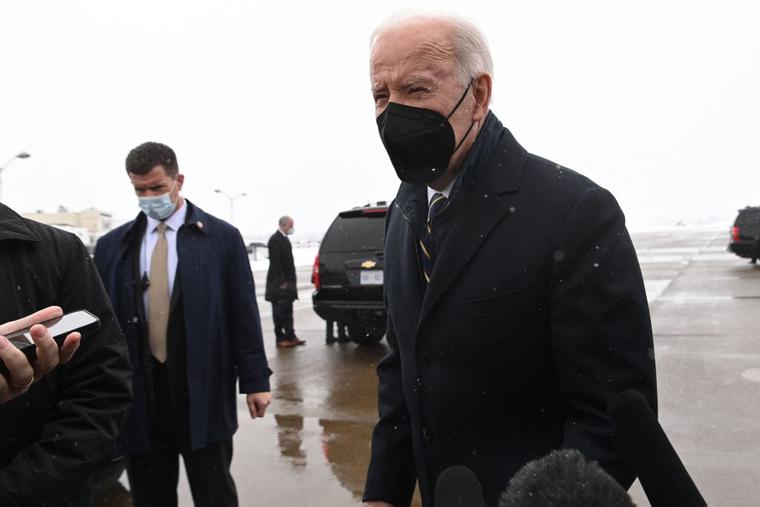Watchdog Group Calls Out Biden Administration’s Religious Exemption Tracking System
COMMENTARY: Legal scholars at the Heritage Institute’s Meese Center are reminding the Biden administration of its duty to recognize and protect conscience rights in the federal workplace.

Should federal workers and contractors be worried that the Biden administration is tracking everyone who asks for a religious exemption for the COVID-19 vaccinations? One watchdog group thinks they should.
At the beginning of this year, Sarah Parshall Perry and GianCarlo Canaparo, legal scholars at the Heritage Foundation’s Meese Center, noticed that the Pretrial Services Agency for the District of Columbia had created something called the “Employee Religious Exception Request Information System.”
According to PSA’s announcement in the Federal Register, the system would maintain “personal religious information collected in response to religious accommodation requests for religious exception from the federally mandated vaccination requirement in the context of a public health emergency or similar health and safety incident.”
That’s right: personal religious information, collected on behalf of an administration that isn’t notably friendly to people of faith. Perry and Canapro pointed out the agency didn’t explain why it needed to create this list, except to say that it would “assist the Agency in the collecting, storing, dissemination, and disposal of employee religious exemption request information collected and maintained by the Agency.” Nor did it reveal what it would do with this information.
All very keen observations.
A week later, Perry and Canaparo released a report that found that at least 19 federal agencies had created or proposed a list of religious objectors to the COVID-19 vaccine. The agencies include the Department of Justice, the Department of Health and Human Services, the Department of Transportation, and the Department of the Treasury, to name only a few.
“It now appears that an increasing number of federal agencies are keeping and preserving those individuals’ names, religious information, personally identifying information, and other data stored in lists across multiple government agencies,” they wrote.
Each of the announcements cited President Biden’s executive order “Requiring Coronavirus Disease 2019 Vaccination for Federal Employees” and his executive order “Ensuring Adequate COVID Safety Protocols for Federal Contractors” as the reason for the new practice. And all were made “Pursuant to the Privacy Act of 1974.”
For those of you unfamiliar with it, the Privacy Act regulates the collection, maintenance, use and dissemination of personally identifiable information about individuals. The purpose of the law is to “balance the government’s need to maintain information about individuals with the rights of individuals to be protected against unwarranted invasions of their privacy from the collection and disclosure of these records by federal agencies.” Under the act, any person has a right — enforceable in court — “of access to federal agency records in which that person is a subject, except to the extent that such records (or portions thereof) are protected from disclosure by one of nine exemptions.” The Act permits only an “individual” to seek access to only their own “records,” and only if those records are maintained by the agency within a “system of records.” Disclosure of these records without an individual’s written consent is illegal unless a specific exception listed in the act applies.
So what are we to make of what, on the face of it, looks like a disturbing attempt to keep track of religious believers who hold views that trouble the government?
On Jan. 24, several Republican members of Congress wrote a letter to President Biden that said: ”The actions that your administration is taking to target federal employees who have applied for a religious exemption to the vaccine mandate will have an immediate, chilling effect on an employee’s exercise of his constitutionally protected right to freedom of religion.” They called on the president to provide a response by Feb. 11 outlining what steps he was taking to “ensure that the federal government is not targeting Americans based on their decision to apply for a religious exemption to the vaccine mandate.”
My view on this is that we should distinguish between this administration’s authoritarian use of vaccine mandates (the Supreme Court recently stopped it from imposing them on private workplaces as well as federal ones) and the creation of this list.
The latter need not have sinister implications. Indeed, you could argue that federal agencies need a system for compiling accurate information about requests for religious exemptions. Doing so may ensure that the requests are taken seriously, and people are not discreetly pressured to comply with mandates that offend their conscience.
It’s a paradox that sometimes people of faith need access to official bureaucratic tools in order to keep track of an unfriendly government’s bureaucratic attempts to keep track of us. So, at the moment, I’m keeping an open mind on the subject of this list. But, that said, we should still be grateful to Heritage and freedom-loving elected officials for keeping us in the loop. They are reminding the administration of its duty to recognize and protect conscience rights in the federal workplace. As I explained earlier, they do have the law on their side. Even so, they need to stay alert.
Andrea Picciotti-Bayer is the director of the Conscience Project.















